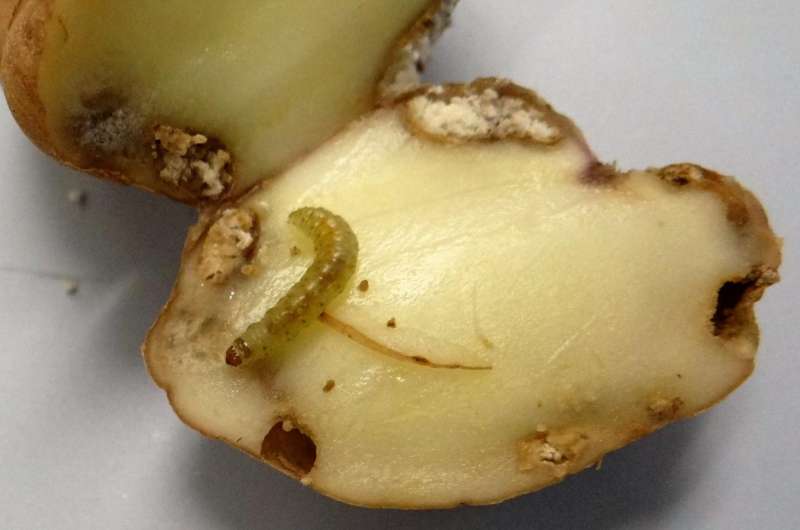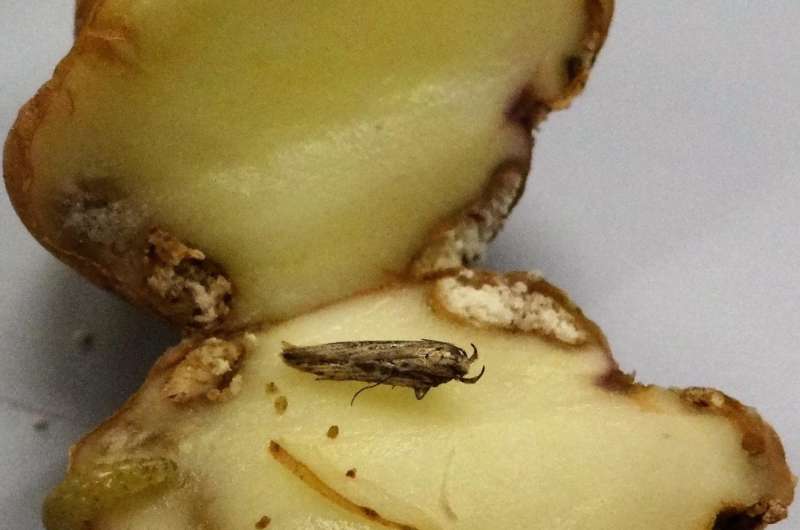Potato plants trigger aboveground defenses in response to tuber attacks

Potato plants boost the chemical defenses in their leaves when Guatemalan tuber moth larvae feed on their tubers, report researchers at the Boyce Thompson Institute (BTI).
While the potato's response may seem counterintuitive, it protects against leaf-eating pests, ensuring that the plant can maintain sugar production, to continue growing tubers during the moth larvae infestation. The study, which was led by BTI Professor Georg Jander and Katja Poveda, Assistant Professor of Entomology at Cornell University, appears in the journal Oecologia. The discovery may one day help reduce potato damage from insect pests and increase tuber yields.
Plants must fend off simultaneous attacks from above- and belowground herbivores, ranging from insects to deer. Scientists are beginning to see patterns in how plants detect and respond to these diverse threats, but no one had investigated how plants signal and respond to tuber attacks.
"The Guatemalan potato tuber moth is a serious pest in Colombia and other potato-growing areas," said first author Pavan Kumar, a postdoctoral scientist at BTI. "This pest is not in North America, but since its first report, it is spreading to different regions and it's hard to control."
A heavy infestation of Guatemalan tuber moth (Tecia solanivora) larvae can destroy a potato crop. However, in pastusa suprema, a potato variety grown commercially in Colombia, if just a single tuber is affected, the plant will overcompensate by sinking more resources into the other potatoes.

BTI researchers investigated the defensive response of pastusa suprema to attacks from underground Guatemalan tuber moth larvae and how those defenses affect two aboveground leaf-eating pests, the beet armyworm (Spodoptera exigua) and the fall armyworm (Spodoptera frugiperda).
They grew Guatemalan tuber moth larvae on a single tuber of a potato plant and then collected leaf and tuber samples from the plant during the 8-day experiment to observe gene expression changes and the production of chemical defenses in response to the infestation. They showed that tubers eaten by the moth larvae sent alarm signals aboveground to activate defense responses in the leaves.
Plants with infested potatoes had higher levels of defensive compounds in their leaves, including chlorogenic acid and glycoalkaloids—bitter-tasting plant toxins. When researchers reared fall armyworm and beet armyworm larvae on these leaves, the larvae gained less weight than when they fed on unexposed plants. This response may help the pastusa suprema plants to maintain healthy leaves with high levels of photosynthesis, so that they can overcompensate for the tubers lost to moth larvae.
But the defensive effects don't run both ways. Tuber moth larvae showed no ill effects when fed on potatoes whose leaves had been chewed by beet armyworm larvae.
However, according to Jander, "The Tecia larvae are highly specialized for feeding on potatoes and may simply be resistant to any tuber defenses that are turned on in response to armyworm feeding on the leaves."
Presently, the insect compounds that sound the alarm in tubers remain unknown.
"In the future, we are trying to understand what those specific compounds are. Is there anything special in that insect spit?" said Kumar. The researchers also plan to look into plant signaling pathways that transmit the signal from the tubers to the leaves.
The compounds that trigger this response could have multiple agricultural uses. If applied to potato fields, they could signal the plants to grow larger tubers, to mimic the effects of tuber moth infestation. These compounds could also boost the plants' defensive response to protect them from leaf-eating insects.
More information: Pavan Kumar et al, Potato tuber herbivory increases resistance to aboveground lepidopteran herbivores, Oecologia (2016). DOI: 10.1007/s00442-016-3633-2
Journal information: Oecologia
Provided by Boyce Thompson Institute



















